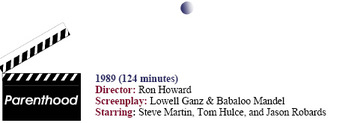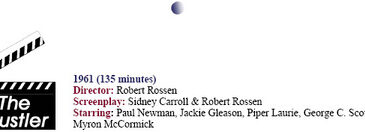This inaugural installment of reviews about gambling-related movies coincides with the publication of Jeffrey W. Dement’s Going for Broke: The depiction of compulsive gambling in film.1 Dement’s book reviews and discusses 21 films that include gambling as a plot element. Cinema classics such as The Hustler are addressed, as are not-quite-classics such as National Lampoon’s Vegas Vacation. Acknowledging the power of the cinema to convey complex characters and situations and the centrality of film as a cultural medium, we present brief reviews and commentary on three movies that may or may not find their way onto the holiday wish lists of WAGER readers.

Based on the novel by Walter Tevis, The Hustler stars Paul Newman as Fast Eddie Felson, an over-confident denizen of pool halls. After losing to the legendary Minnesota Fats (Gleason), Eddie falls into dissoluteness and meets Sarah (Laurie). The pair meet Bert Gordon, an unscrupulous promoter who feeds Eddie’s obsession with beating Fats in a rematch. Ultimately, it is Sarah’s suicide that wakes Eddie from his fixation. Also interesting is the role that alcohol plays in Eddie’s life. The scene below depicts an interaction between Eddie and Gordon:
Gordon: Eddie, you’re a born loser.
Eddie: What’s that supposed to mean?
Gordon: First time in ten years I ever saw Minnesota Fats hooked, really hooked. But you let
him off.
Eddie: I told you, I got drunk. Gordon: Sure you got drunk, the best excuse in the world for losin’. No trouble losin’ when you got a good excuse. And winning – that can be heavy on your back too, like a monkey. Drop that load too when you got an excuse. All you gotta do is learn to feel sorry for yourself. That’s one of the best indoor sports, feelin’ sorry for yourself. A sport enjoyed by all – especially the born loser.2
It is tempting to attribute Eddie’s troubles to compulsive gambling. But is his gambling really central to his apparent illness, or is it incidental to a underlying obsession with victory and revenge? Or, Eddie might not be ill at all – only a victim to an overactive drive for success.

Demonstrating that persons with gambling problems can come from all socioeconomic status groups, the protagonist of The Gambler is university professor Axel Freed. Freed’s compulsion to gamble ultimately costs him his relationships with his mother, grandfather, and girlfriend. His situation worsens when his life is endangered by a bookie (Sorvino). Unlike Eddie of The Hustler, Freed’s pathology is clearly linked to an uncontrollable impulse to wager. The Gambler similarly addresses the relationship between pathological gambling and other high-risk behaviors; in one scene, Freed finds himself in a fight with a pimp after picking up a prostitute. Freed supplies numerous rationalizations and justifications for his behavior, both in and out of the classroom. After losing $50,000 on a single bet, he explains:
Freed: Look, it’s just something I like to do. I mean, I like the uncertainty of it. I like the threat
of losing. I mean, the idea that I could lose, but that somehow I won’t because I don’t want to.
That’s what I like.
Dement characterizes The Gambler as a wholly anti-gambling film. But being "anti-gambling" should not be confused with being concerned with pathological gambling. The existence of healthy forms of gambling behavior is not precluded by the movie; rather, The Gambler serves as a sensitive portrayal of the suffering experienced by a compulsive gambler and those he loves. The Gambler is a classic film and a favorite of the WAGER editorial staff.

As Dement acknowledges, Parenthood is not really a film about gambling. Paralleling gambling’s role in real lives, gambling in this movie is but one theme among many subplots. Larry (Hulce) returns home after a three-year absence. He has a history of engaging in get-rich-quick schemes, and his family is wary of his latest venture into sports betting. The conflict climaxes with Larry’s accrual of $26,000 of debt to a bookie, who threatens death. Parenthood illustrates the dangers and potential consequences of illegal gambling. But Dement’s description of Larry as "ravaged by disease" is uncertain. It is entirely possible for a gambler to find himself in Larry’s situation without being diagnosable for pathological gambling. Rather than being a victim of a psychiatric disorder, Larry may be a victim of his own naivete and poor judgment. Such a distinction is often difficult to make, and poses numerous problems for a legal system unsure of the nature of gambling-related problems. Although gambling is only tangential to the central plot, Parenthood remains an original portrait of American family life.
Source: 1Dement, J.W. (1999). Going for broke: The depiction of compulsive gambling in film. Lanham, Maryland: The Scarecrow Press, Inc. 2Dialogue transcript from a plot summary available at filmsite.org.
The WAGER is funded, in part, by the National Center for Responsible Gaming, the Massachusetts Department of Public Health, the Andrews Foundation, the Addiction Technology Transfer Center of New England, the Substance Abuse and Mental Health Administration Services, and the Center for Substance Abuse Treatment.




